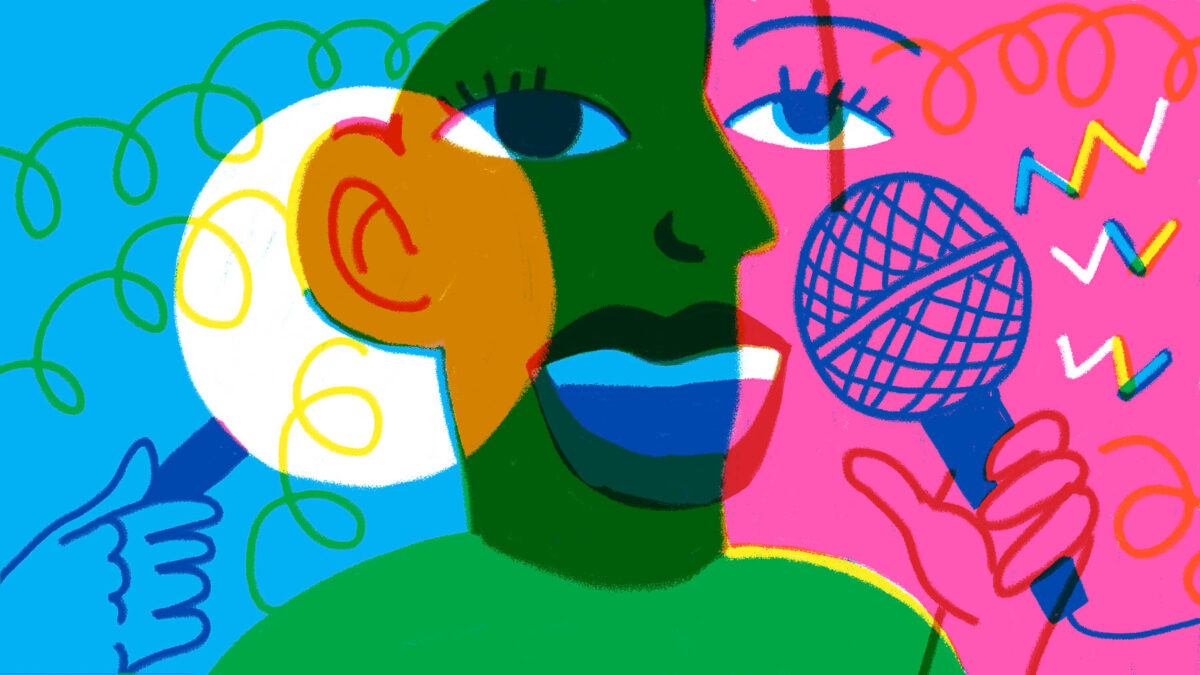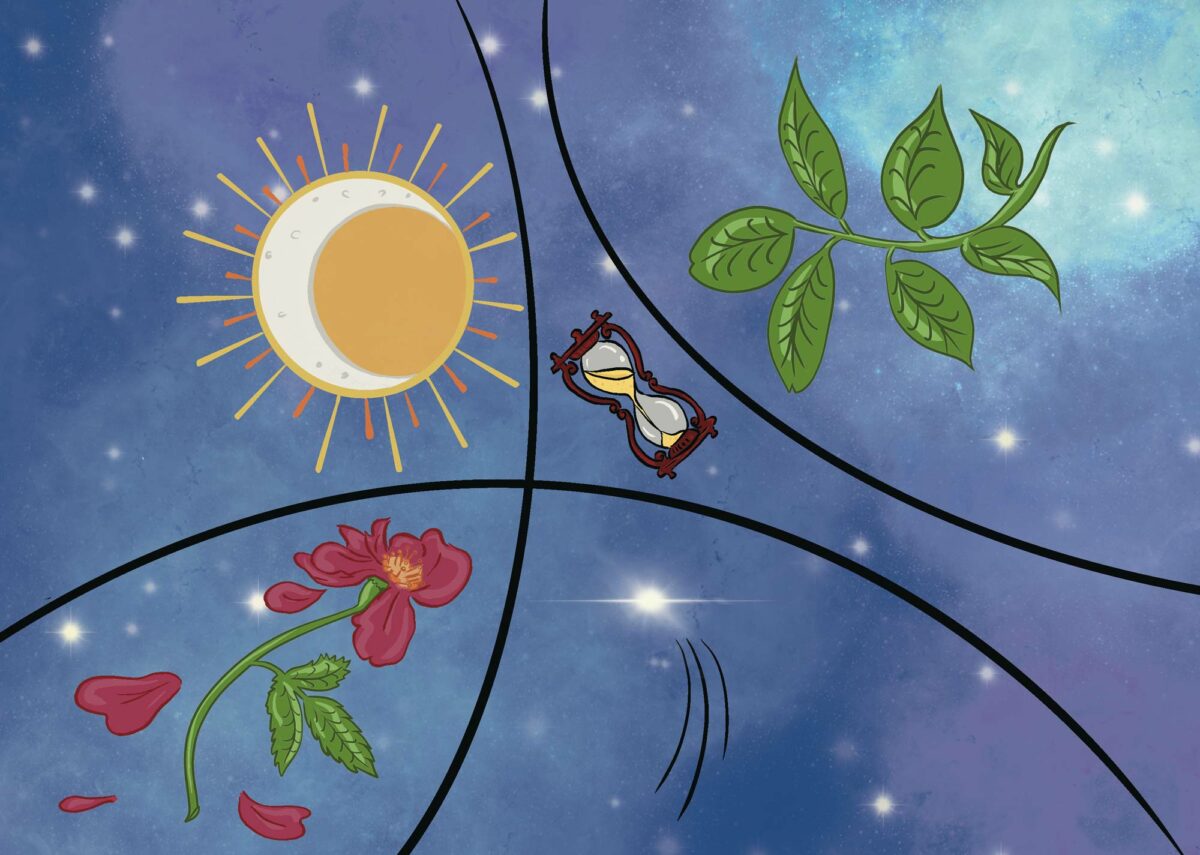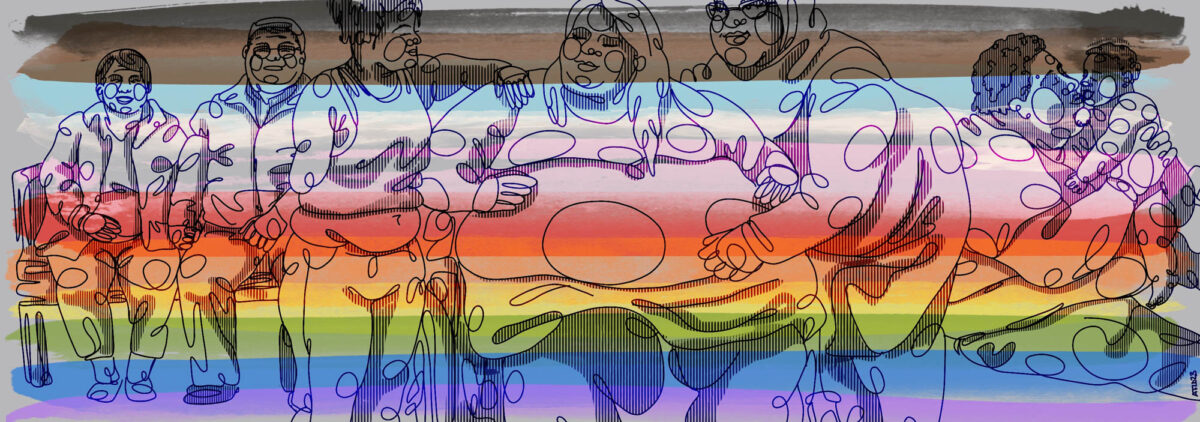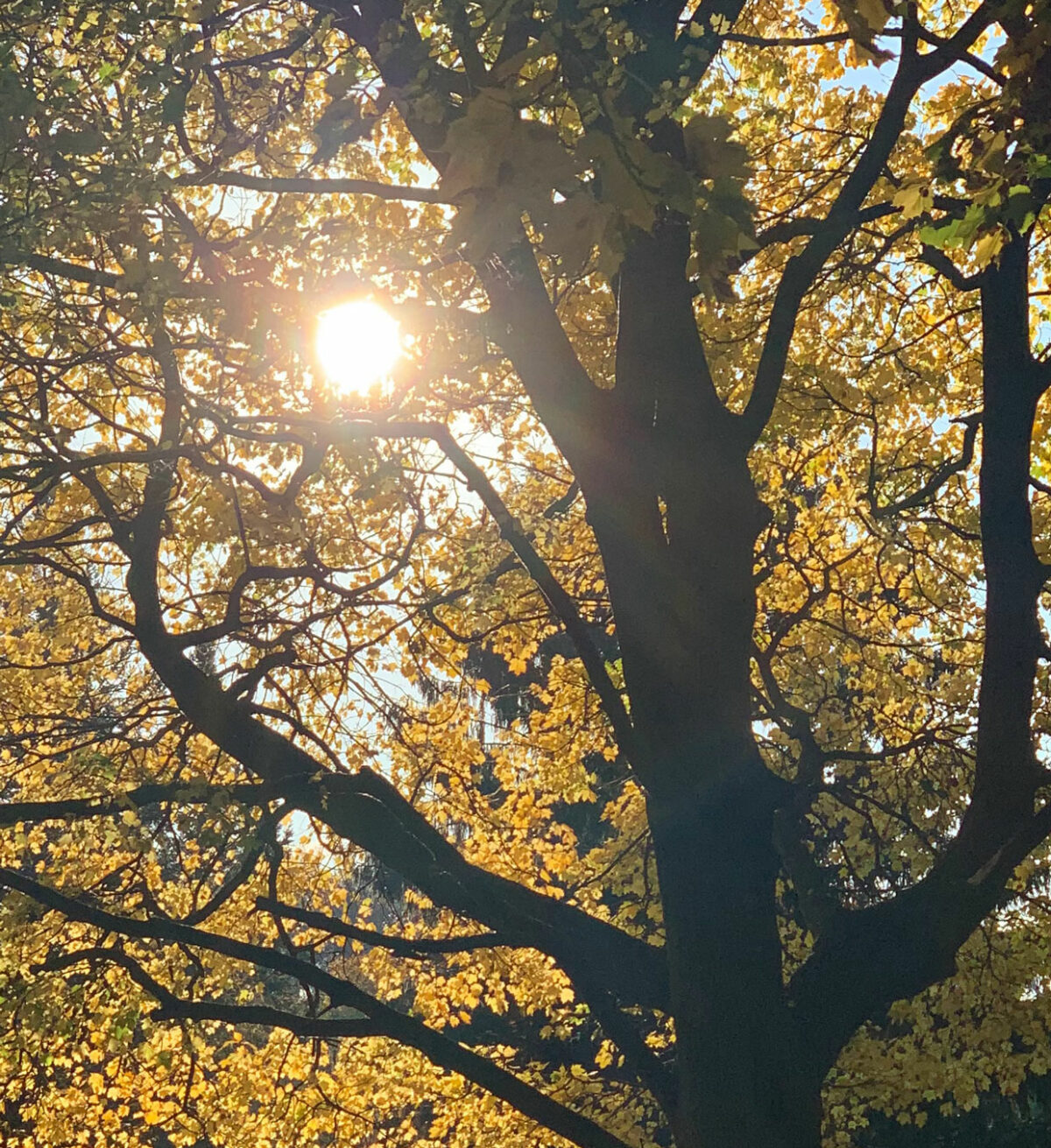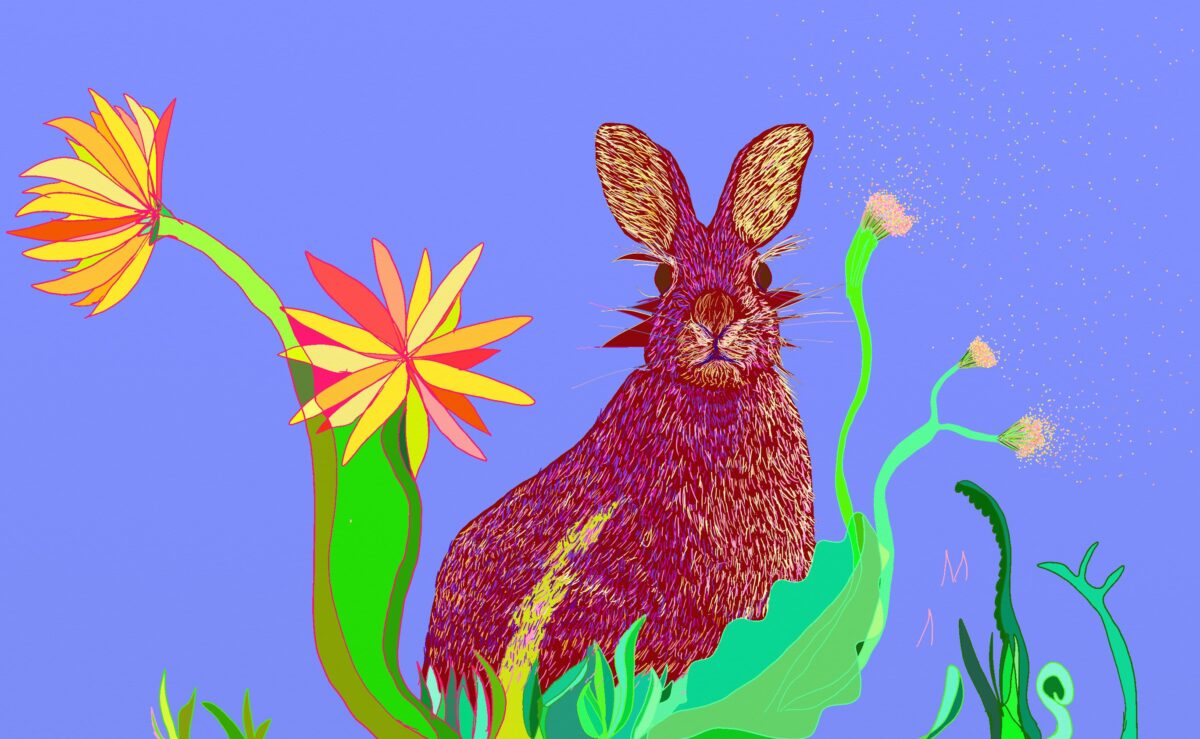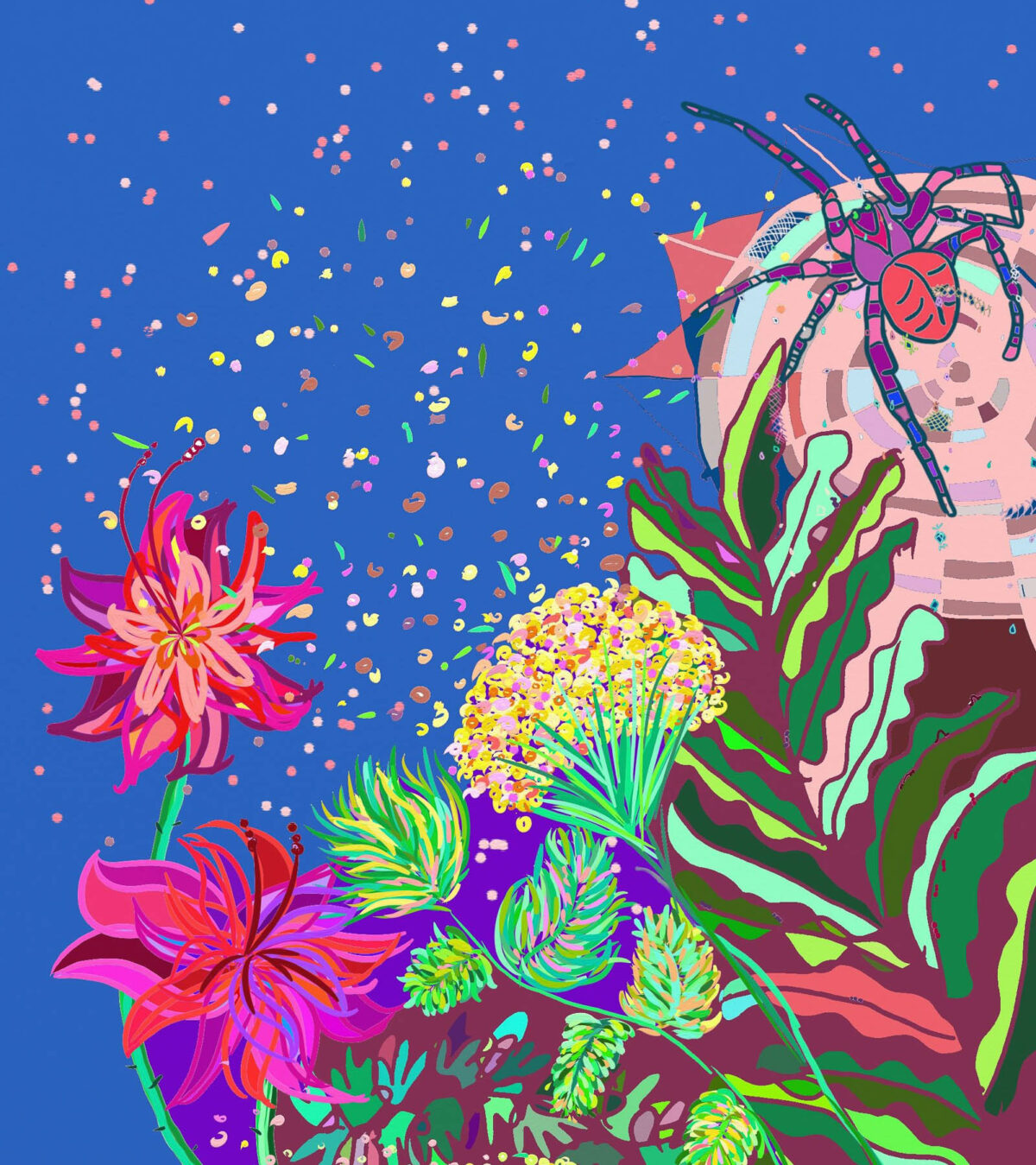Table of Contents
- What is Relaxed Performance?
- What Does it Mean to “Relax” a Space?
- Disability Justice
- Relaxed Performance Pedagogy
- Leading with Difference
- Understanding the Context
- Online and Social Media
- Vital Practices
- Decolonial Praxis
- Land Acknowledgements in Relaxed Performance
- Funding and Policies
- Acknowledgements
- References
This module draws from Relaxed Performance Pedagogy: An Illustrated Guide. It can be used by anyone, but has been written for students, educators, and administrators in higher education. The resources we offer centre on Turtle Island, but you can adopt and adapt Relaxed Performance (RP) as a vital practice in your geographic area and discipline.
Learning Objectives
- You will understand the theory behind Relaxed Performance and how to integrate into your praxis
- You will become familiar with disability cultural practices and learn how to incorporate them into your practice
- You will understand Relaxed Performance as a vital practice and learn how to move from best practices to vital practice
What is Relaxed Performance?
Relaxed Performance (RP) is a radical arts intervention rooted in disability theatre and performance practices.
Rooted in U.K. based autism activism, RP is a key movement in making theatre accessible in Canada. It has been described as “opening up theatre” (LaMarre et al., 2019) by breaking down physical, attitudinal, sensory, financial and other barriers, transforming the theatre space into an entirely different experience.
RP invites people to be themselves, and “bodies to be bodies” (LaMarre et al., 2021) as people access the arts.
To learn more about RP and its history, British theatre maker and comedienne, Jess Thom, offers some Relaxed Performance: FAQs (Tourettes Hero, 2016).
What Does it Mean to “Relax” a Space?
To “relax” a performance is to infuse a performance with radical potential that centres disability. The work of “relaxing” involves extending a “warm welcome to anyone who might find it difficult to follow the usual conventions of theatre etiquette” (Tourettes Hero, 2015). Though the term “relaxed” is commonly used to increase accessibility in performances for children and young adults, its scope is much wider as RP has been used at festivals, movie theatres, and grocery stores.
RP performances remove the strict expectations of performance etiquette by allowing audience members to stand up, move around, and make noise. Though “relaxed” measures may look and feel different from one space to the next, commonly these measures include quieter-than-usual sound cues, the dimming of bright lights, visual stories and/or access guides and the availability of a “chill-out” space, which is a quiet room or area where people can go to relax and take a break from an event.
Activity
Relax Your Space: Thinking Through Bodymind
Disability Justice
Disability justice centres the experiences of the most impacted and expands how we think about accessibility (Hamraie, 2020). RP, as an arts intervention, invites us to think about accessibility broadly and can employ disability justice to consider intersectional barriers to arts spaces (LaMarre, et al., 2021).
Disability justice refers to an intersectional activist movement led by Indigenous and Black people, people of colour and queer and trans disabled people who have experienced marginalization in the broader culture and the mainstream disability rights movement. In centering the lives and interests of impacted communities, disability justice approaches disability and ableism from an intersectional perspective, which takes race, gender, sexuality, class and age into account with a decolonizing lens.
Beginner
10 Principles of Disability Justice
(Sins Invalid, 2015)
Beginner
Disability Justice – Mia Mingus
(Mingus, 2013)
Intermediate
Disability Justice – A Working Draft by Patty Berne
(Berne, 2015)
Intermediate
This is Disability Justice
(Lamm, 2015)
Advanced
Disability Justice – POC Online Classroom
(POC Online Classroom, n.d.)
Advanced
#StaceyTaughtUs Syllabus: Work by Stacey Park Milbern
(Piepzna-Samarasinha & Wong, 2020)
Advanced
Implementing a Disability Justice Framework: A Toolkit
(Page, 2016)
Relaxed Performance Pedagogy
Pedagogy refers to the theory and practice of teaching and learning.
A theory is a system of ideas intended to explain something and practice is the application of those systems of ideas. Practice also encodes theory and through developing consciousness of our practices (through considering why and how we do things) we generate new theory. This means that theory and practice are complexly interconnected.
Critical pedagogy, a term coined by Brazilian philosopher and educator Paulo Freire (2005), links learning with social justice.
Critical pedagogy aims to create a ‘critical consciousness’ in learners by inviting learners to question assumptions and challenge oppression. As a pedagogical praxis RP confronts and critiques colonial and ableist legacies of injustice by mobilizing “collective struggles across difference” (Zembylas, 2018) to imagine vital world-building possibilities. In this way, RP pedagogy draws upon critical pedagogical traditions and stretches beyond these to become decolonial.
RP pedagogy is rooted in strategies developed by RP trainers, known as Access Activators (Tangled Art + Disability, n.d.), who design and mobilize disability justice-based curricula. This means developing pedagogy that is context-specific and responds to the local needs of communities.
Activity
Relax the Space: Thinking Through Access
An important part of critical pedagogy and RP pedagogy is paying attention to who we cite. Simply, citation is a way of showing who you are and where you are going (Guzman & Amrute, 2019).
Leading with Difference
RP pedagogy is responsive. It addresses evolving community needs, industry standards and disciplinary conventions. It also responds to the colonial institutional settings such as the histories of arts and performance spaces, university and college classrooms, houses of worship and elsewhere in which many artists develop and deliver performances.
Spaces and practices carry histories and so responding to the colonial sensibility or whiteness of a space means questioning what has happened in that space and who has, and has not been, welcomed in it in the past.
People teaching RP often go “off-script” and draw on their own lived experiences of difference to bring the significance of RP to learners. Disabled, D/deaf and aging people with varied experiences accessing the arts are in the best position to lead and teach RP. Relaxing the classroom challenges ableist expectations of classrooms and of performance spaces.
Ableism refers to the intentional or unintentional prejudice against disabled people. It can refer to individuals’ negative attitudes and values about disability, to assumptions or expectations imposed on people to act in certain ways in interactions, and to broader environments, institutional settings, and practices that erect barriers to access for disabled people.
“I am not relaxed… Best to let the students trickle in in silence. I can’t see a single person in front of me, but I am sure people are there.”
Listen to Dr. Jessica Watkin reading her story of bringing Relaxed Performance into the classroom. This is an excerpt from the article Relaxed Performance: An Ethnography of Pedagogy in Praxis (Rice, et al., 2020).
Beginner
Cripping the Arts: It’s About Time
(Reid, 2016)
Beginner
What are the Broader Effects of Relaxed Performance on Society?
(British Council Canada, 2020)
Beginner
Relaxed Performance: An Illustrated Guide
(Collins, et al., 2022)
Intermediate
Accessibility: Pushing the Boundaries of Theatre Performance
(Rice & Besse, 2020)
Intermediate
Introduction: Cripping the Art in Canada
(Chandler, 2019)
Advanced
Letting Bodies be Bodies: Exploring Relaxed Performance in the Canadian Performance Landscape
(LaMarre, et al., 2021)
Advanced
Studies in Social Justice Special Issue: Cripistemologies of Disability Arts and Culture: Reflections on the Cripping the Arts Symposium
(Chandler, et al., 2021)
Advanced
Innovative Pedagogical Approaches to Access and Mental Health
(Shanouda, et al., 2018)
Advanced
Academic Ableism: Disability and Higher Education
(Dolmage, 2017)
Understanding the Context
When teaching and hosting RP it is necessary to understand your context. This means understanding disciplinary norms as well as the physical and online space in which the RP will take place. A context-specific RP pedagogy refers to local community understandings of disability history, culture, and aesthetics which support the implementation of site-appropriate accessibility strategies.
Tensions can arise when hosting RP in a discipline for the first time. For example, some learners may not understand why RP is needed and it may challenge their assumptions about the norms of their discipline. In disciplines where RP is practiced more frequently and is itself becoming a disciplinary norm there may be fewer tensions. When teaching or learning about RP, think through disciplinary norms, their potential roots in colonial or ableist practices and how to stretch beyond disciplinary boundaries.
A context-specific RP pedagogy means learning with and from local communities about accessibility in the area. For example, the inclusion of American Sign Language (ASL) is a commonly held accessibility requirement in Ontario, but the integration of ASL interpretation is a non-standardized practice that varies from region to region on Turtle Island. However, it should not be assumed that securing ASL interpreters is possible without understanding interpreters’ availability from place to place. ASL is not the only sign language used across Turtle Island. Many people in the province of Quebec know Quebec Sign Language, known in French as Langue des signes québécoise or Langue des signes du Québec (LSQ); and some Indigenous people communicate through Indigenous Sign Languages such as Plains Sign Language (PSL) (Perley, 2020) or Oneida Sign Language (OSL) (Oneida Language and Cultural Centre, 2016).
Beginner
Making Accessible Media – Communication: Sign Language
(Grimard et al., 2021c)
Beginner
Making Accessible Media – Communication: Hearing and Deaf Interpreters
(Grimard et al., 2021a)
Beginner
Making Accessible Media – Communication: Indigenous Sign Languages
(Grimard et al., 2021b)
Intermediate
“Relaxed” vs “Extra Live”
(Tourettes Hero, 2015)
Intermediate
Land Back: A Yellowhead Institute Red Paper
(Pasternak et al., 2019)
Advanced
Vital Practices in the Arts
(Chandler et al., 2020)
Advanced
Universities Must Open Their Archives and Share their Oppressive Pasts
(Kelly & Rice, 2020)
Advanced
Centre for Indigegogy – Programming and Certificates
(Centre for Indigegogy, 2023)
Online and Social Media
When hosting an online RP, chat functions and break-out rooms can be used to enhance audience engagement. This enables audiences to participate “in a comfortable environment” without “all the stress” from travelling to an unfamiliar location.
Additionally, social media has become an important tool for RP promotion and community connection. Our research shows that social media was a significant way of engaging with accessibility. Accessibility features online included the use of high colour contrast, alternative text and much more.
For instance, Tangled Art + Disability highlighted social media accessiblity in their Instagram post, “How Do You Make Your Digital Images More Accessible? A Guide to Alt-Text and Image Description.”
Beginner
Beauty to be Recognized – Instagram
(Beauty to be Recognized, n.d.)
Beginner
How Do You Make Your Digital Images More Accessible? A Guide to Alt-Text and Image Description
(Tangled Arts and Disability, 2021)
Beginner
Make Your Social Media Posts More Accessible
(Akimbo, 2021)
BEGINNER
Deaf Artists and Theatres Toolkit: Website and Vlogs
(Deaf Artists and Theatres Toolkit, 2016)
Intermediate
Making Accessible Media
(Grimard et al., 2021d)
Intermediate
How Do We Incorporate Relaxed Performance in Digital Media?
(British Council Canada, 2020a)
Advanced
Alt-Text as Poetry
(Coklyat & Finnegan, n.d.)
Advanced
Accessibility Toolkit: A Guide to Making Art Spaces Accessible
(Zbitnew et al., n.d.)
Vital Practices
Vital practices attend to the embodied, shifting, and lively nature of artistry. Learners need guidelines for strong accessibility practices, but it is critical that instructors and learners use these as starting points only. Guidelines and shared knowledge can be successfully paired with non-prescriptive, open-ended approaches to justice-oriented RP that supports the creation vision of the artists and performers.
ACtivity
Relax Our Space: Thinking Through Community
Think about your relationship to community with this guided reflection video.
Praxis Orientation
RP pedagogy supports the development of vital practices instead of compliance-based best practices. Unlike best practices which focus on individual accommodations, vital practices welcome difference as an integral part of context-specific accessibility praxis. Vital practices are context-specific, rooted in community knowledge, and responsive to evolving accessible praxis. A praxis orientation means we use theory to inform our practices and we use insights emerging from our practices to inform theory.
Why Relaxed Performance
Some people feel pulled between checklist-based approaches and the principles of disability justice. Our research highlights the benefits of using both approaches at once: checklists support the pragmatic parts of pulling together an RP, while an open-ended, justice-oriented approach to RP makes space for bodymind differences and guards against RP becoming formulaic. An open-ended, justice-oriented approach to RP encourages taking a creative and improvisational approach to imagining access.
How It Begins
A vital RP pedagogy begins with context-specific accessibility and therefore it turns to local and community disability knowledge when multiple and perhaps conflicting access needs are at play. For example, some RP attendees may require reduced noise levels whereas other attendees may need the space to make additional noise. A vital practice might be to offer different sensory levels at alternating showings in consultation with communities.
Your RP might begin with your region’s accessibility standards and then stretch beyond them through local community-centred knowledge. In Ontario this may mean referring to the Accessibility for Ontarians with Disability Act (AODA) and then consulting with local communities to move beyond legal compliance. If a best practice is to include American Sign Language (ASL) in performances, a vital practice might involve making time to consult with D/deaf, aging and Indigenous communities and artists to develop a stronger understanding of their context-specific cultural and linguistic practices, needs, and interests.
Beginner
Cripping the Arts Access Guide
(Cripping the Arts, 2019)
Beginner
Deep Accessibility
(Ford, 2013)
Intermediate
Changing the Framework: Disability Justice
(Mingus, 2011)
Intermediate
Why Access is Love and There is Now Such Thing as “Barrier-Free”
(Thomas, 2019)
Advanced
Vital Practices in the Arts
(Chandler, et al., 2020)
Decolonial Praxis
As an intersectional, justice-based praxis, RP confronts the colonial conditions under which it takes place by engaging in and committing to decolonization.
Decolonization involves working towards restoring the self-determination and sovereignty of Indigenous peoples. It means respecting Indigenous people and their lived experiences and moving away from ways of thinking that give white people (settlers) unjust rights and privilege over Indigenous peoples.
Decolonizing Relaxed Performance
As a first step toward decolonizing RP, context-specific RP pedagogy might include learning and teaching about the needs and interests of local Indigenous communities and developing non-prescriptive decolonizing gestures in consultation with these communities.
One example is found in the play bug, created, and performed by Yolanda Bonnell (Ojibway-South Asian) (Bonnell, 2020). For this production, Bonnell and her director welcomed Indigenous women and Two-Spirit audience members into the space before the show and prioritized their responses in the question-and-answer period after the show. The production also had an Indigenous counsellor with traditional medicines on hand at every performance to support audience members in moving through some of the difficult material explored on-stage.
Beginner
Decolonizing the Body: Indigenizing Our Approach to Disability Studies
(Presley, 2019)
Intermediate
Anti-Colonial Disability Arts & Activism
(Driskill, 2019)
Intermediate
Decolonizing Relaxed Performance: A Visual Translation of Vital Ecosystems
(Collins et al., 2022)
Advanced
Relaxed Performance: An Ethnography of Pedagogy in Praxis
(Rice et al., 2020)
Advanced
Decolonizing Disability Through Activist Art
(Rice et al., 2021)
Land Acknowledgements in RP
A land acknowledgement is a statement of recognition about the First Peoples and the lands on which a performance occurs. Both First Peoples and their lands have important pasts, present situations, and futures that we seek to understand and acknowledge. Disability justice underscores the need for RP practitioners to be in relation with communities most impacted. This means knowing the colonial history of the discipline or art form that RP planners are working within, which, in some cases, will involve building long-term relationships with community members who hold this knowledge to do better than the “standard” land acknowledgement.
Beginner
A Digital Land Acknowledgement: Existing as a Settler on Unceded Land: A Guide
(Lee, 2020)
Intermediate
Guide to Acknowledging First Peoples & Traditional Territory
(Canadian Association of University Teachers, n.d.)
Advanced
Rethinking the Practice and Performance of Indigenous Land Acknowledgement
(Robinson et al., 2019)
Funding and Policies
Sustaining RP means expanding accessible funding models both internal and external to the institutions in which RP training and RPs take place. To maintain the vitality of RP, this funding must focus on accessibility as a community desire rather than an individual responsibility. RP training is an important addition to existing curriculum as it prepares students for their respective industries and broadens their thinking about accessibility.
Diversity agendas are sets of principles used by many organizations and institutions in the attempt to ensure the fair and respectful treatment of all people and representation of equity-deserving groups in a welcoming, inclusive environment where all can participate. In the context of RP, following such internal policies is insufficient. RP production involves connecting with and calling-in groups that remain underrepresented by such policies.
External funding opportunities may be useful to support RP training and planning. Funding opportunities may include local and national arts grants designed to support accessible arts training and praxis; learning and teaching grants designated for access-related projects and collaborations with impacted communities; and online program development funding to support the cultivation of vital accessibility practices online.
The following resources offer suggestions for accessible arts funding in Canada:
Acknowledgements
This section builds on RP training modules developed by the British Council Canada. It also draws on the findings from research by the British Council Canada and Bodies in Translation: Activist Art, Technology and Access to Life (BIT) including the Relaxed Performance: Exploring Accessibility in The Canadian Theatre Landscape (British Council Canada & Bodies in Translation, 2020b) and the Relaxed Performance: Exploring University-based Training Across Fashion, Theatre and Choir (Jones et al., 2022) reports.
The partnership between Bodies in Translation and the British Council has produced an ever-growing body of knowledge on RP in Canada.
An illustration by Sonny Bean of a large, pink and purple spider sitting atop a collection of pink, red, yellow and green flowers and foliage. Above, small petals and grains of pollen float against an intensely blue sky.
